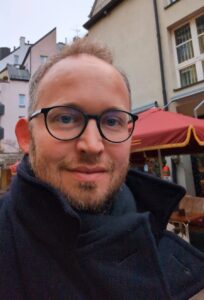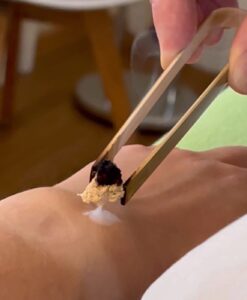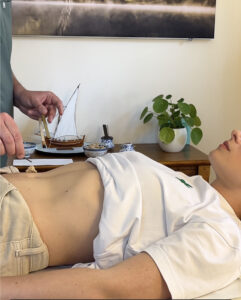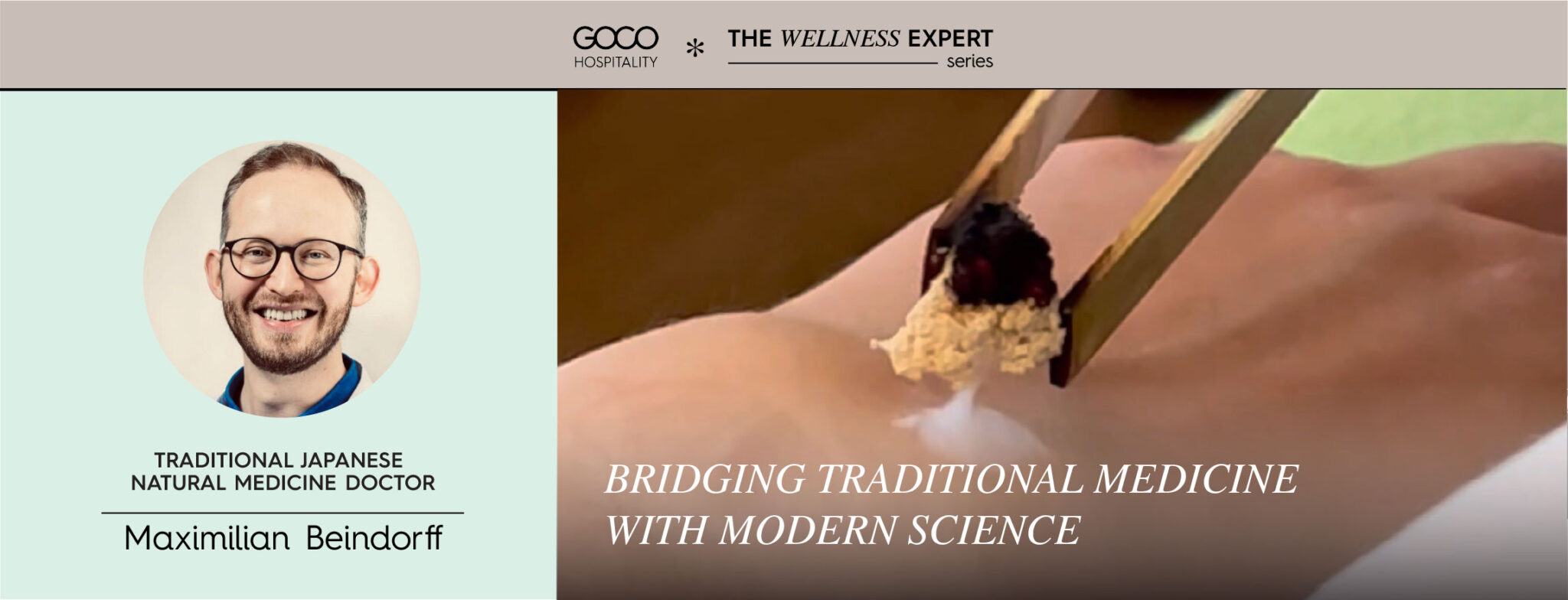Wellness Expert Series | Bridging Traditional Medicine with Modern Science
Featuring Maximilian Beindorff
Meet Maximilian Beindorff, a German-Canadian holistic health innovator who stands at the fascinating intersection of traditional wisdom and modern healthcare. With extensive international practice spanning Germany, Oman, Saudi Arabia, and Russia, he brings a unique cross-cultural understanding to integrative medicine. As the sole inheritor of a rare Japanese Moxa Therapy technique personally passed down through mentorship with a renowned master practitioner, Maximilian preserves and evolves this ancient healing art for modern wellness applications. He creates personalised treatment pathways that address root causes rather than merely managing symptoms.
Former Head of Naturopathic Medicine at Munich’s KIOR Health Centre and now leading Praxis Beindorff, he develops personalised treatments that address root causes, not just symptoms. Also a published poet, Maximilian brings creative depth to his clinical work, recognising that true healing is both art and science. Recently a featured speaker at a Saudi Wellness Association panel alongside leading academics, he continues to shape the future of integrative wellness.
 Maximilian Beindorff
Maximilian Beindorff
During our discussion with Maximilian, we asked him about the intersection of traditional medicine and modern society as well as medicine, how it can coexist with modern evidence-based medicine and contemporary lifestyles, what is its unique value now and in the future, given the rapid growth of AI, biotech, and data science.
In simple terms, how would you define the core philosophy of Traditional Medicine, and how is it still relevant in today’s fast-paced world?
The fundamental philosophy underlying all traditional medicine is elegantly simple: the pursuit of complete health. This principle drives every healing tradition, from acupuncture to indigenous shamanic practices, addressing one profound question: How does an individual who has fallen ill restore their wellbeing?
Etymologically, “health” and “whole” share the same roots and to be truly healthy is to achieve wholeness across body, mind, and spirit. In today’s hyperconnected yet fragmented society, we are constantly pulled by external demands: endless notifications, packed schedules, and information streams. Traditional medicine philosophies offer a pathway back to integration, providing time-tested approaches to reconnecting with what makes us complete.
What do you believe modern medicine can learn from Traditional Medicine in terms of understanding the human body, disease, and healing?
The most significant lesson lies in adopting a truly holistic perspective recognising that the human body operates as an interconnected, open system in dynamic relationship with itself and its environment. Traditional systems understand that internal states influence external reality, and vice versa.
We’re witnessing this shift already. Progressive hospitals incorporate color theory and biophilic design into patient rooms, acknowledging that environmental factors directly influence healing outcomes. Traditional medicine also offers therapeutic approaches proven effective across centuries. The microbiome, presented as cutting-edge research, exemplifies this, and traditional systems have long recognised gut health as fundamental to overall wellness, with Hippocrates articulating this in the 5th century BCE.

Japanese Moxa Therapy
How do you see Traditional Medicine coexisting with modern evidence-based medicine? Are there examples of successful integration in hospitals or clinics today?
If both sides would stop with the name-calling and sit down together for the well-being of their patients, I believe there is a great future for their coexistence. The two approaches complement each other so well. Traditional Medical professionals can not do what doctors in hospitals do. A person who has broken their arm or been in a car accident doesn’t need a herbologist or osteopath; they need to have their bone set or undergo a life-saving operation. On the other side, Modern Medical professionals may not have viable long-term solutions when it comes to chronic issues. Traditional Medicine has shown great effectiveness in this area, I believe due to the concept of seeking the root cause of the disease, rather than suppressing symptoms along allopathic pathways. In my view, the opposition from one side to the other comes from prejudices as well as a lack of understanding of the other side. We are all medical professionals and should start to act as such, for our own sake and the sake of our patients.
Prestigious institutions are demonstrating successful integration: Mayo Clinic’s Integrative Medicine Program, Cleveland Clinic’s Center for Integrative & Lifestyle Medicine, Johns Hopkins’ integrated services, Thomas Jefferson’s Myrna Brind Center, and cancer centers like Toronto’s Sunnybrook Hospital all blend complementary therapies with conventional treatments while maintaining the highest medical standards.

Courtesy Maximilian Beindorff
What advice would you give to someone interested in incorporating TM into their lifestyle without giving up modern healthcare practices?
My advice would be to find something that is simple yet effective to do while being in alignment with who you are as a person. Just because something is en vogue does not mean it is for you. Try to stay away from following the herd and try everything that piques your interest. If you like it, stick with it; if you do not, keep looking. There is such a huge variety of different practices you can incorporate, but if it is a struggle for you to keep it up, it may not be for you.
It’s important to maintain realistic expectations. Not every ancient practice is inherently superior, just as not every modern innovation is automatically beneficial. Some so-called “ancient” practices are much more recent than their marketing suggests. The goal is to find those approaches that you genuinely enjoy and can sustain long-term, creating a journey of both wellness enhancement and self-discovery.
Are there particular chronic conditions where TM offers unique value compared to or in combination with Western medicine?
My clinical experience shows particular effectiveness with chronic digestive disorders, skin conditions, musculoskeletal pain, arthritis, and arthrosis. These conditions often respond well because traditional medicine focuses on underlying systemic imbalances rather than surface symptoms.
For serious conditions like cancer, collaboration with conventional teams is essential, but traditional medicine provides invaluable supportive care that can mitigate treatment side effects, enhance comfort, and support natural healing mechanisms during intensive protocols.
What role do you see for AI, biotech, and data science in the future of Traditional Medicine?
This is one area, I believe Traditional Medicine has an advantage over modern medicine. The techniques we use are based on our knowledge and understanding of the human condition. This is impossible for a computer or AI system to achieve. It can learn which acupuncture points cure which diseases, but this is completely wrong and would not work. While there are descriptions of point actions and indications in acupuncture textbooks, the former are based on the philosophical foundation of this tradition, and the latter is a rather poor way of making these terms understood in today’s medical jargon. Each point is an access to the entire interconnected system of that individual. A machine can analyse gait, x-rays, MRI results, or microexpressions with incredible accuracy. However, it does not have the power of human intuition linked with experiential knowledge to fall back on. In my view, this is where Traditional Medicine can shine.
AI builds on data science to feed its models. In the case of biotech, it can then create new ways of folding proteins or arranging biological sequences that would have taken us decades to figure out. Given this amazing capacity, I would have to stress again that we are not machines whose parts can be interchanged without consequence. If so, all drugs would have no side effects, and transplants would just be accepted by the body in the same way that a car accepts its new tires. AI can free us from the monotony of the mundane and elevate us to new heights of creativity, in medical fields and beyond.
To learn more about Maximilian Beindorff, please visit his website, hp-beindorff.com

